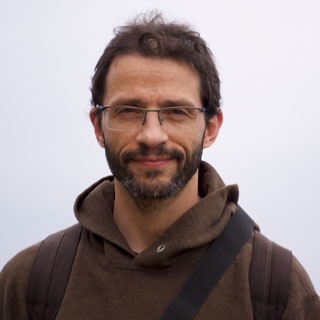Pol Capdevila
5. Kaleidoscope
AI is not the worst problem

Pol Capdevila,
Professor in the Department of Humanities and teaching coordinator of the degree in Humanities
Overwhelmed by the lack of candidates for the precarious contracts the university offers, the department head decides to outsource a subject to a piece of artificial intelligence (AI) software. The machine will prepare the content and, through an avatar indistinguishable from a real-life lecturer, will dictate it to students via streaming. It will even be able to answer students’ questions.
Such a situation is already all but possible with the available technology. And we know that, once the technology is there, somewhere it will end up being used, especially where there is no ambition to deliver quality teaching. There are studies that claim that AI software will affect the work of 80% of professionals who produce texts and images. This means that using technical skills to prepare texts – as many journalists, lawyers, tourism guides, editors, screenwriters, translators, programmers, amongst so many others, do – will become an activity largely done in collaboration with generative software. In many cases, it is predicted that this will reduce the time workers need to dedicate to tasks by 50%, and companies will want to benefit from it.
for us, in addition to their communicative function, texts are, above all, the best way for students to develop and reflect a series of complex and specialized cognitive skills that could be grouped under the concept of critical thinking
Thus, the value until now assigned to knowing how to write properly in the context of a largely agraphic society will continue to decline across many industries. This is also a concern for those of us in humanities programmes. However, for us, in addition to their communicative function, texts are, above all, the best way for students to develop and reflect a series of complex and specialized cognitive skills that could be grouped under the concept of critical thinking. As Kant wrote in his Critique of Judgement, the ability to discern enables cognitive processes such as the identification of specific aspects of a complex event, the comparison of similarities and differences between analogous situations, the imagining of alternative situations, and reflection on those very cognitive processes themselves. The Prussian philosopher also explained that the practice of discernment, when done without the intention of making a profit, generates pleasure and an empathetic relationship with the situation or people involved. That is why we know that the practice of critical thinking tends to develop in people an ethical and aesthetic relationship with the natural and social environment.
Research in the arts, philosophy and history is an excellent way of fostering this relationship, because they are cultural expressions that do not, in themselves, meet practical needs, and developing the ability for critical thought in them can lead to a very high degree of autonomy. Unlike machines, humanities students can understand the relevance of a metaphor in a given historical and social context, discriminate between two seemingly identical works of art, and know that the historical past can be changed and that, whilst AI can statistically predict the future, it falls to them to transform it.
Writing texts that put these skills into practice requires many hours of dedication, effort and concentration from students. A good text is often the result of a counter-practice of the homogenizing dynamics of our accelerated society. Dynamics that so happen to make text-generation software an even greater temptation than traditional plagiarism. Nevertheless, the difficulty or, surely, impossibility of tracing this fraud cannot exempt those of us in the humanities from continuing to ask for calm and patiently matured texts.
To counteract the possibility of academic fraud, we will need much more physical and spiritual presence. Not only to return to oral tests as instances of control. We will need a greater presence throughout the teaching-learning process that allows us to get to know students and their specific abilities better, so that they can discuss the differences between human and AI-generated texts and find ways to enrich their writing and, thus, their critical thinking. A presence that machines will not be able to replace and that is, in other studies as well, increasingly necessary to be able to maintain the university’s teaching role, without which, it would not exist.
The question is whether our university is interested in upholding the quality of its teaching. I am actually more concerned about this issue than about the development of AI.
